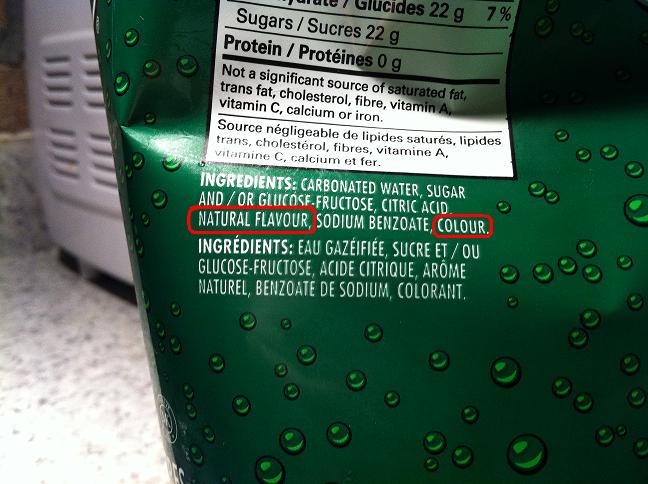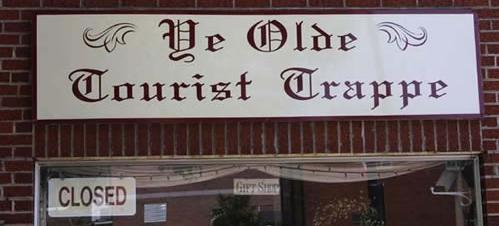Wordle II: Wordle Harder
I realize I posted one of these not too long ago, but I was struck sufficiently by this wordle cloud, based on the current state of the site, that I wanted to share.

I realize I posted one of these not too long ago, but I was struck sufficiently by this wordle cloud, based on the current state of the site, that I wanted to share.

 I realize this is just one of those things I’m supposed to have gotten used to in our modern age, but I still find the idea of something being labeled “Natural Flavour” off-putting.
I realize this is just one of those things I’m supposed to have gotten used to in our modern age, but I still find the idea of something being labeled “Natural Flavour” off-putting.
This is actually the remnant of a bottle of ginger ale, why couldn’t they have just written ginger? Is it really natural, or is “Natural Flavor” just the pseudonym they gave to some complex compound they cooked up in the lab?
Technically, everything has a flavour, so, for all I know, my soda was made tasty with baby squeezin’s. (I assume they were squeezed by hand, to maintain the naturalness.)
Also, what is colour made of?
While doing some research for Flash Pulp’s current Blackhall tale, I came across some interesting, if disturbing, history that I wanted to pass on.
Some quick background beforehand, however: Fort Henry, a military fort in Kingston, Ontario, was actually constructed in 1832, right around the time of our story, in an effort to protect the waterway supply route in case of American invasion. (It would also go on to be used as an internment camp for political prisoners during World War I.)
That said, I encountered some sinister information on Fort Henry’s School Room page (emphasis mine).
In 1867, the British Army provided free education for the children of soldiers and for those soldiers wishing an education. It was not until 1870 that a public school system was offered outside of the army.
[…]
At the age of 14, the children had the choice of remaining with the army, or looking for work in town. Many chose the army, because if they stayed in town, they would be left behind when the regiment moved on. Boys could join the army as soldiers; girls, at the age of 14, had two years in which to find a husband before they were forced to leave the fort. Soldiers were not permitted to marry before they had achieved 14 years of good service in the Army, thus girls usually married men more than twice their age.
Yikes – although I do find it interesting that, like many social institutions, public schooling began as a for-government-employees-only initiative that later expanded to include the full public. (I’m looking at you, American healthcare.)
Still, nowadays a fourteen-year-old girl marrying a thirty-something would likely lead to an arrest, back then it was simply military protocol.
I’m again reminded of a Monty Python quote from The Meaning Of Life:
Here is better than home, eh, sir? I mean, at home if you kill someone they arrest you, here they’ll give you a gun and show you what to do, sir. I mean, I killed fifteen of those buggers. Now, at home they’d hang me, here they’ll give me a $%#@ing medal, sir.”

The use of the term “Ye” to represent an Early Modern English form of the word “the” (traditionally pronounced /ðiː/), such as in “Ye Olde Shoppe”, is technically incorrect. This mistaken attribution is due to the medieval usage of the letter thorn (þ) the predecessor to the modern digraph “th”. The word “The” was thus written Þe. Medieval printing presses did not contain the letter “thorn”, so the y was substituted owing to its similarity with some medieval scripts, especially later ones. – wikipedia
It’s not Ye as in yes, it’s actually The, even though all those old time-y signs are also incorrectly printed, as they’re missing the thorn character.
None of which helps this The Olde Courist Crappe sign (found here), however.

 (image from MagneticTimes.com.au)
(image from MagneticTimes.com.au)
The Spectacled Flying Fox is probably the cutest species of bat that man has encountered.
From the wikipedia article (emphasis mine):
Characteristically, all species of flying foxes only feed on nectar, blossom, pollen, and fruit, which explains their limited tropical distribution. They do not possess echolocation, a feature which helps the other sub-order of bats, the Microbats, locate and catch prey such as insects in mid-air. Instead, smell and eyesight are very well-developed in flying foxes.
[…]
Local farmers may also attack the bats because they feed in their plantations, and in some cultures it is believed their meat can cure asthma.
Mind you, I understand this is sort of like identifying the cuddliest shark.


In no way to honour my birthday, I thought I’d introduce a new feature to the site: Simple Answers To CNN’s Stupid Questions. All of these are found on today’s CNN front page.
Up front, the sport section hits us with a hat-trick:

[youtube=http://www.youtube.com/watch?v=QoPWALM2riQ]
 Yes.
Yes.
![]() – with bats!
– with bats!
Thank you, good night!
 The new idea: Sheen Squad – a reality television show that follows the exploits of the unit of elite Los Angeles police officers tasked with cleaning up in the wake of the walking crime-wave that is Charlie Sheen.
The new idea: Sheen Squad – a reality television show that follows the exploits of the unit of elite Los Angeles police officers tasked with cleaning up in the wake of the walking crime-wave that is Charlie Sheen.

Forget it, Jake. It’s Chinatown.
does not have the same ring as:
Forget it, Jake. It’s Scotlandtown.
– and definitely not the same as:
Forget it, Jake. It’s the end of town where all the foreign folks live.
Still, I could see a movie being made around:
Forget it, Jake. It’s Jonestown.

 A few years ago, Jessica, my brother Codos, and I, were Christmas shopping in an HMV, when we encountered something I have never forgotten.
A few years ago, Jessica, my brother Codos, and I, were Christmas shopping in an HMV, when we encountered something I have never forgotten.
A woman entered the store from the mall beyond, a bundle in her arms which she held with some care. As she moved to speak with a friend who’d already been browsing the albums, the angle changed and I could see what she was cradling.
It looked like a child, a boy of maybe five, but his skin was a shade I’m hard-pressed to describe. Pea-soup green maybe, or the colour of lush but rotting jungle foliage, and with an aspect as if a portion of skin might peel away and fall to the floor at any moment; not in the sense of a dollop of costume make up, but in that of an advanced leper.
The most unsettling part were the boy’s eyes, lolling as his mother turned about the store, bright against his Lovecraft-ian face.
I certainly do not mean to offend, I have no idea what condition the child might have been suffering from, but it’s a hard image to shake: the tender affections of the woman as she cradled a boy who looked like he may have been dead a week.
 I understand that there’s a lot to dislike in processed foods and sugary snacks, but I sometimes wonder if the current “obesity epidemic” is partially a long term backlash to The Great Depression.
I understand that there’s a lot to dislike in processed foods and sugary snacks, but I sometimes wonder if the current “obesity epidemic” is partially a long term backlash to The Great Depression.
My grandmother, (or Memere, as we call her,) wasn’t the most obsessive of the post-downturn hoarders that I’ve met, but throughout most of her life she maintained a small vegetable garden in the backyard; she made sure plates were full, that the scraps were used for something (often soup), and that leftovers were treated with proper respect.
(It was also common for my grandfather, Pepere, to refer to bologna as “poor man’s steak”.)
I don’t see anything wrong with the way Mom handled things, but everyone I know was raised with the same refrain of “you’re not getting up from that table until you’ve cleared your plate”, or “finish your ——, or no desert”. Are these just echoes of our grandparent’s lack? A warning to finish now what we might not have tomorrow?
[youtube=http://www.youtube.com/watch?v=3OPQqH3YlHA]